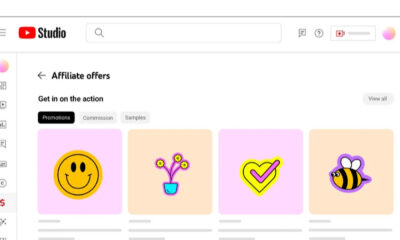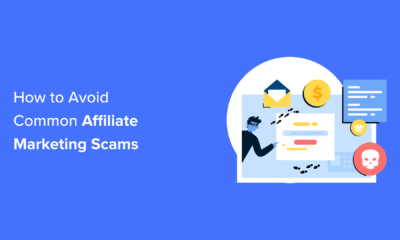AFFILIATE MARKETING
How to Monetize Your Website in 2021

With a bit of hard work and implementation of smart strategies and tools it is possible to monetize a website in 2021!
But before I tell you about these website monetization strategies, there are some things you should consider.
Monetizing a website takes time and dedication. You may not earn the expected amount at first, but don’t allow that to be a barrier between you and your freedom.
To achieve the results you want, there are some universal attributes each seven-figure website possesses.
Today, we are going to unearth those characteristics, learn how to implement them, and turn your website into a profitable business.
Let’s get started!
1. Start with Affiliate Marketing
Affiliate marketing is one of the simplest ways of earning money as it’s 100% passive income, and you don’t even need to create your own products or services.
According to research by Alchemy Coder, eCommerce has progressed at a spectacular rate after the pandemic, which resulted in the new affiliate marketing golden bubble.
The research shows that the same pandemic forces steering the rapid-fire growth of eCommerce websites have also resulted in unemployment. People who lost their jobs started looking for different ways to make money online and some have found affiliate marketing as a good way forward.

It just takes three steps to begin with affiliate marketing:
- Create an account with sites offering affiliate opportunities like Amazon
- Find products that are relevant and beneficial to your targeted audience.
- Promote these products on your website. Or add one landing page as an online store.
Then, when your website visitors use your affiliate links to make the final purchase, you receive a portion of the total amount as a commission. It can be anywhere between 30-70%, so there is great opportunity out there to endorse products and make money.
However, there’s a catch. For an affiliate marketing success, you need to:
- Properly reveal your affiliate links or how you are connected with the products or services
- Don’t promote anything or everything without testing the quality of products or checking reviews
- Recommend only products and services that your audience want
If you are set to begin your affiliate journey, make sure you have access to essential affiliate marketing tools. These tools use unique tracking links to record leads driven by each affiliate program. They also give you a 360-degree view of how affiliate links are performing and how much you earn from each.
2. Create a Profitable Podcast
As podcasts continue to mushroom, more and more people are jumping on the opportunity. They are setting up new shows to reveal their expertise, build a personal brand, grow an audience, connect with more influencers and enhance their business exposure.

Many people have added podcasting as a part of their marketing strategy and are successfully generating income out of it.
If you too have something to share with the world through podcasting, here are a few ways you can profit from your show:
- Sponsor Your Podcast: Generally, sponsors aim to sell their products or raise brand awareness. They are ready to pay you based on the total number of podcast downloads. Some sponsors pay you per 1000 downloads – known as the CPM (cost per mille.) Other advertisers or companies pay you based on the total sales your podcast generates.
- Boost the Sales of Your Products and Services: If your podcast is relevant to the products or services you sell, you can think of many ways to slip them into your podcast conversation. Natural mention of the product, benefits or an exclusive discount on the relevant product can increase sales.
- Repurpose Your Content into a Paid Product: By knowing which part of your podcast listeners like the most and what they want to know more of, you can quickly turn these topics into a saleable product like an ebook or tool.
Let’s say you run a lifestyle business. You could create a podcast on how to live your lifestyle and generate income simultaneously. Then, you could find sponsors in the fitness world as it’s relevant to the lifestyle industry and sell their stuff on your podcast.
Take it further and promote your products or services like a book on living your life fully. Finally, collect some insights from your podcast regarding what your audience is interested in. Perhaps it’s generating income while travelling the world. Convert those insights into a sellable product (maybe another book). Then repeat the entire process to keep your income flowing.
Now, if you’re ready to start a podcast, you need a home to host your podcast where you can store your audio files and build an RSS feed of your podcasting channel. The platform will keep all your podcast episodes organized and distribute them to popular directories like iTunes, Spotify, Google Play, etc.
3. Side Hustle with an Online Course
If you have something valuable like a skill to share, you can create online courses out of it and sell them on your website.
The e-learning market is estimated to reach $325 billion by 2025. So you will never run out of students if your online course adds value.
Plus, monetizing a website through courses is a simple process that anyone can follow:
- Select a topic/niche/skill
- Develop a new website or include your course into an existing one
- Upload the teachings and promote them
Creating online courses can be a lucrative solution as your website traffic is a crucial source of income.
More traffic = More Clicks = More Income
If you are a recognized authority in your field and have a strong brand presence, you can introduce a certification program. It can be an advanced e-course associated with homework, exams, and scores.
Copyblogger, a well-known content marketing tools and training site, provides an authority program for content marketers and writers. The blog (and the bloggers) have unquestionable credibility in their industry, which puts a stamp of approval on their programs.

While the idea behind an online course is easy, the process of actually creating them isn’t. It involves more than just recording a video. You have to build an eLearning site, an entire step-by-step course program, develop assignments (if necessary), design the course chapters, and much more.
However, online course creation platforms streamline the entire process. These platforms provide all the tools you need to create, teach, launch, and manage your e-course—so you can concentrate more on developing valuable content.
4. Launch a Paid Membership
A membership website is a restricted part of a website charging a small fee from members to give them access to unique, premium content. Also known as the paywall method.
Take Ness Labs, for example, a site helping people work mindfully. It restricts access to some of its content, thoughtful discussions, events, and special deals for premium subscribers.

The reason why membership sites work is that if your content is worth improving people’s lives, you can charge people repeatedly, like monthly, quarterly, or yearly, to give access to protected content. Members will happily pay to keep the valuable information flowing and to keep their account active.
If you want inspiration to turn your free content into a paid one, you can look at some successful examples with six figures income.
Online forums are another excellent way to communicate with your online community, solve their problems, and make money while doing so. The simplest way to monetize forums is by granting paid access to groups as per their needs. For example, if you run a health and fitness website, you can develop an appropriate pricing forum for losing weight or developing strength. This way, users focusing on the diet will pay to connect with diet conscious people and muscle gainers will pay to gain knowledge on strength building.
5. Sell Digital Products
Selling digital products is another excellent monetization method if you have little time as it doesn’t require you to create content continuously, like blog posts. You create the product and then promote it to your target market.
There are numerous options for selling digital products online. Here are some popular categories:
Ebook
Turn your expertise into an ebook and put a price tag on it. For instance, Tiffany Alliche is a financial educator. She has published many successful ebooks on money for both student and non-student audiences.

Music
Thanks to the ability to store and send audio digitally, we can sell music online. DECAP, an American record producer, sells his drum kits online.

Meditation Recordings
In today’s world more and more people are seeking easy ways to destress and mediation is a great way to do it. The top 10 meditation apps alone earned a whopping $159 million in 2020. If you can record guided meditation audios, you can turn them into Mp3 formats and sell them on your site.
Affirmations
Affirmations are positive statements helping people cope with self-sabotaging and negative thoughts. For example, a statement like “I am love. I am purpose” can generate positive thoughts. You can create an entire ebook on positive affirmations and sell them on your webpage. Jack Canfield, a motivational speaker, sells the Success Affirmations book on his website.

6. Make Money with Website Flipping
Flipping is about purchasing a product, revamping it and selling it for a profit. Similarly, website flipping is buying an existing, inactive website, improving its overall features, optimizing it for various search engines, and attracting traffic.
You have to look after the website in a similar way you care for building your online business. Once your website achieves a considerable amount of traffic, you can sell it at a much higher rate than your original buying price.
People having basic writing and optimizing skills can quickly flip a website. However, you do have to take care of certain things before and after buying a website:
- Find websites that you are familiar with
- Look for a memorable domain. It’s much better if it possesses highly searched keywords
- Next, select a platform to host your website
- Prepare your website with all the templates and inbuilt plug-ins it needs
- Then, focus on publishing unique, quality content consistently that attracts traffic
- Optimize your website with keywords and search engine requirements
- Lastly, promote content on social media sites to enhance traffic
As soon as your site is ready to sell, you could exhibit it at different auction platforms or find buyers online. Once you and the buyer agree on the cost and terms, you have to transfer the domain under the buyer’s name, and after that, they will take charge of your website. Repeat the steps above to continue website flipping and earn money.
7. Turn Your Expertise into Virtual Coaching
If you have mastered a specific skill or possess expert knowledge in your industry, you can offer one-on-one online coaching sessions or charge for online group classes. It’s a great way to spread your experience, help the community, and generate recurring income.
One of the significant advantages of virtual coaching is that you don’t need a huge audience to secure a healthy income stream. That’s because customers pay more for customized, one-on-one programs.
For example, Nagina Abdullah helps women lose weight. She claimed to earn approximately $20,000 from one-on-one coaching. That is also with less than 5000 subscribers.

Now, when it comes to online coaching, you have a choice to go for simple and private Skype coaching sessions. Or conduct online retreats to meet large groups in person.
Let’s say you are a yoga expert and you want to create an additional income stream from online yoga classes. You can offer one-on-one yoga training personalized to each individual’s needs. Or you can also announce online retreats for a group.
For example, Adriene Mishler, an international yoga teacher, hosts live, virtual sessions on Yoga, meditation, and other self-care topics. Her recent online session was about “Anchored in Love.”

If you are following a welfare purpose, you can also add donation buttons enabling people to contribute to the common cause.
8. Become a Well-Paid Freelancer
Another way to monetize your website is to show it as a portfolio promoting your knowledge, skills, and experience. Freelancers often rely on various platforms to offer their services, but according to Hubstaff’s 2017 studies, on average, freelancers having websites charge 65% more than others without websites.
For example, ToyFight offers creative services like research, strategy, branding, illustration, UX, and Development. Their website perfectly portrays who they are and what they do. Most importantly, their website covers their work experience and past projects.

Other freelance ideas include becoming a copywriter, proofreader, digital marketer, social media marketer, SEO expert, web developer, translator, SEO expert, etc.
9. Offer a Problem-Solving App
Since we are gradually relying more on our smartphones and other handy devices in our daily working lives, social lives, and even when we’re alone, it has become common to rely on apps to finish our everyday tasks. And it is in the glory of day-to-day personal or professional problems that make the app industry truly shine.
So if you think that you can solve a problem for your customers, the opportunity is right there. Develop a problem-solving app and monetize it.
In the past, small businesses have been sceptical about developing a professional mobile app. High costs of hiring experienced developers and maintaining an app for a lifetime have added to this weariness.
However, app development costs have dropped significantly, and one can create them with extra ease. With today’s no-code solutions, everybody can build SaaS apps without the need to write code. The app-building and launching of apps have become a piece of cake with the help of drag and drop features.
Now that we have removed every barrier to creating apps, here are some popular ways to monetize them.
- Offer in-app purchases
- Enable subscription service providing a different experience to paid users than the free ones
- Run in-app ads. Make sure the ads align well with your products or services
- Connect with sponsors, brands, and trusted partners that may want your mobile app to connect with their target audiences
10. Publish Sponsored Posts and Product Reviews
One way to make money by blogging on your website is to negotiate sponsorship deals with other businesses.
You can charge companies for:
- Publishing a blog relevant to the company with a link to their website
- Review your sponsor’s products or services in your article
- If you have an email list, you can include sponsor’s content in your newsletter for better exposure
- Bonus promotions on social media bring an added advantage
BuzzFeed sponsored content shows how brands are using relevant sponsored posts to raise awareness and build trust. Hot Wheels, a children’s toy company, sponsored a post on BuzzFeed regarding children’s playtime.

As you see, BuzzFeed created an opportunity by following its own content style, then paired it with a brand having topic authority.
11. Advanced Ways to Monetize with Google Adsense
Google AdSense is one of the most common and easiest ways to earn some cash as it requires minimal setup. You can quickly place ads on your blog or website. For newbies, it is called a PPC (pay per click) – an online advertising model where website owners make passive income whenever a visitor clicks on banner ads.
Selling ad space is another advertising model where you earn money by offering free space on your website to promote other brands’ products or services. These ads take the form of links and appear at the bottom of your website pages, as sidebars or tiny pop-ups.
Here is the example of an art and design blog, We and the Color, who display ads at the top and side of its homepage, giving readers something to explore more than what meets their interests.

As the method follows the pay-per-click or pay-per-visitor model, advertisers will pay you based on the number of visitors clicking the ad.
The selling ad space method is a bit time consuming, but it amplifies revenue when a website grows. However, to get the most out of this method, you need to generate more website traffic and have a high conversion rate.
So here’s how you let advertisers or brands know that you sell ad space:
- Prepare a media kit consisting of the statistics and facts (like page views, clicks, etc., of your website)
- Send the media kit to potential buyers. Tell them why your website is a good fit for their products or services.
- Once you land a few deals, use Google Ad manager to organize your advertisers.
You can also use Google Analytics to see your website’s information (page views, etc).
12. Offer Value with WordPress Plugins
If you are a WordPress user or have ever been, you will be aware that you can’t run a WordPress website without installing a few plugins.
Right?
These plugins insert extra features to streamline the WordPress blogging process. They work as problem solvers for website owners.
One of the worth-mentioning examples here is the Elementor page builder. This mega page building plugin aims at making it easy for you to create custom page layouts and is used by 4+ million WordPress sites. Additionally, the plugin developer monetized it by launching a premium version called Elementor Pro containing advanced features.

If you have a solution to a problem and can convert it into a plugin that your audience is looking for, nothing can stop you from making money out of it. Just make sure to develop plugins based on the specific needs of your targeted audience.
13. Sell Through Influencers
Whether you are selling digital or physical products, you need influencer marketing to increase your sales.
Of course, PPC and social media marketing drive clicks. However, the click doesn’t necessarily convert. An Influencer marketing strategy, on the other hand, follows a different approach than direct selling. Influencers leverage their influence among their followers to generate product interest which ultimately leads to conversions.

You can leverage influencers or use influencer marketing in a number of ways. For example:
- Start an affiliate program and increase your physical or digital products’ sales
- Send influencers your products for free to try, promote, or give a testimonial
- Invite influencers to join your webinars during a launch
- Publish guest posts on an influencer’s website or blog
- Show up as a guest on influencers podcasts or interviews
Following the above steps will get you more referrals, which turns into MORE SALES!
Plus, there are many influencer marketing platforms to choose from which can help you track campaigns, and measure results.
To Conclude
You can start earning money with one method only. But applying a couple of methods will help you create multiple income streams. It’s important to monitor which methods work best to maximize your website monetization.
And guess what?
You don’t need to work on each tactic exclusively. They all are correlated. Suppose you create a website to promote and sell affiliate products. Slowly, as the traffic grows, you can start personal coaching on your expertise to level up your income. Next, pack your coaching solutions into an online course and invite your audience to join. In the midst of it all, create a digital product like an ebook and sell them on your website.
Keep trying a mix of different approaches. Double down on what’s working. Eliminate what’s not. Continue the process to keep the money flowing to your website. At last, don’t forget to tell us what worked for you the best.
AFFILIATE MARKETING
AI Will Transform the Workplace. Here’s How HR Can Prepare for It.

Opinions expressed by Entrepreneur contributors are their own.
Our workplaces are about to undergo an unprecedented level of transformation, and HR will take center stage. Artificial intelligence will dramatically reshape HR in a way that goes beyond recruiting, hiring and talent management. Leadership teams at all levels need to embrace this change to transform and lead their organizations forward.
It’s the people, and not the technology, that makes AI initiatives a success. Intrapreneurs, in particular, are the driving force behind it. As I shared in Fearless Innovation, I noticed this when I was working on the innovation agenda for the Great Places to Work study — the most innovative companies were those that had a leadership team that was embracing intrapreneurship and were open to change.
HR is the beating heart of any organization, and as such, it needs to take center stage in both adopting and leading ethical and innovative AI transformation across the organization.
Related: How Artificial Intelligence Is Reinventing Human Resources
4 tectonic shifts AI will drive in HR
1. A new wave of massive reskilling
As AI becomes more prominent across business functions, the need for new skills will only grow. Forty percent of enterprise leaders believe that their workforce would need to reskill as a result of AI and machine learning. In fact, research shows almost a third of all hours worked in the U.S. could be automated by 2030.
All of us need to reskill to some extent to be relevant in the AI era. Not only would people need to re-train, but generative AI is introducing a whole host of professions that have been non-existent until recently, from AI ethicists to human-AI interaction designers. Some of these roles might sound futuristic, yet they are becoming increasingly relevant as technology advances.
2. The great restructure
As automation takes center stage across more business functions, there will be the inevitable need for organizations to restructure and rethink how they work. This transition will not only involve the integration of new technologies but also introduce a shift in the workforce dynamics. Intrapreneurs will need to identify gaps both in skills and operational processes and forge brand-new roles for themselves and those they manage. HR must play a key role in enabling a smooth and easy transition in this regard. The transition will not be smooth or easy, and it’s only HR that has the capability to make it impactful.
3. Arrival of “digital humans”
“Digital human” may sound like an oxymoron, but that’s the term that’s starting to appear in business and operational plans. More roles, regardless of industry, are becoming digitally enhanced where some form of AI assistance is embedded in their everyday work. A real-life example is the introduction of the digital nurse — AI-powered healthcare agents which have already been proven to outperform human nurses in certain tasks.
Imagine the impact these digital roles will have on the workforce the more sophisticated and prevalent they become. Eventually, HR will need to create policies and systems in place that account for this new type of “staff augmentation.”
4. Regulating the robot
The threat of AI bias and misuse is serious. Not only can the technology put many jobs at peril, but potential improper implementation can expose organizations to serious liability and negatively affect the workforce. From avoiding bias to inclusivity, HR teams play a critical role in the ethical deployment and management of AI technologies.
HR professionals will be tasked with navigating the delicate balance between leveraging AI for efficiency and ensuring that its application upholds fairness, privacy and non-discrimination.
What HR intrapreneurs must do to embrace AI the right way
The future of work is being shaped by AI adoption, and its success hinges on the right approach from the outset. My experience shows that for successful organizations, one universal trait stands out: the presence of change agents. Every organization, regardless of size, benefits from intrapreneurs who are open to change and committed to spearheading transformation efforts. These intrapreneurs are pivotal in driving the future of work, as they help orchestrate the integration of new technologies into their business models.
HR and talent leaders should harness this dynamic, encouraging a symbiotic relationship with intrapreneurs to develop customized solutions for AI adoption, ensuring that they are not just keeping pace with technological advances but are actively shaping their trajectory.
Securing a seat at the table:
HR should take a proactive stance in the adoption of AI, even if it is still in its early stages within your organization. By securing a position at the forefront of the AI initiative, HR can and should facilitate and guide the entire organization in embracing this significant change.
As AI has the potential to impact every facet of the organization, it is imperative for HR to not only understand and advocate for this technology but also lead its integration across all departments. HR should encourage and support intrapreneurs and all employees to leverage AI in their daily tasks, demonstrating its value not just for operational efficiency but for personal and professional growth as well.
Master the technology:
To effectively navigate and regulate AI, HR must first understand it thoroughly. Grasping the full potential of this technology is crucial for reaping its extensive benefits. HR plays a vital role in identifying the necessary tools and skills that employees must acquire and then integrating these learnings into daily work practices.
Before implementing AI more broadly, HR should initiate comprehensive training programs that not only educate but also reassure employees about AI’s role in the future of the business. By leading these educational initiatives, HR can shape the structure and effectiveness of these programs, ensuring they meet the needs of the organization and its workforce.
Related: 3 Ways to Prepare Your Business For an AI Future
Looking ahead
Generative AI has the transformative potential to redefine the business landscape, but realizing this vast potential hinges on more than just the adoption of technology. It critically depends on the talent within the workforce, driven by HR and bold intrapreneurs. These visionary leaders don’t just implement new tools; they exemplify their use, demonstrating the profound impact of AI across every level of the organization.
HR plays a pivotal role in fostering this environment, enabling intrapreneurs to guide and inspire every individual they touch. Together, they turn each employee into a catalyst for change, igniting a widespread passion for innovation that deeply resonates and sustains long-term success.
AFFILIATE MARKETING
Samsung: 6-Day Workweek For Execs, Company in Emergency Mode

Four-day workweeks might have all the buzz, but one major tech company is going in the opposite direction.
Samsung is implementing a six-day workweek for all executives after some of the firm’s core businesses delivered lower-than-expected financial results last year.
A Samsung Group executive told a Korean news outlet that “considering that performance of our major units, including Samsung Electronics Co., fell short of expectations in 2023, we are introducing the six-day work week for executives to inject a sense of crisis and make all-out efforts to overcome this crisis.”
Lower performance combined with other economic uncertainties like high borrowing costs have pushed the South Korean company to enter “emergency mode,” per The Korea Economic Daily.
Related: Apple Is No Longer the Top Phonemaker in the World as AI Pressure and Competition Intensifies
Executives at all Samsung Group divisions will be affected, including those in sales and manufacturing, according to the report.
Samsung had its worst financial year in over a decade in 2023, with the Wall Street Journal reporting that net profit fell 73% in Q4. It also lost its top spot on the global smartphone market to Apple in the same quarter, though it reclaimed it this year.
Though employees below the executive level aren’t yet mandated to clock in on weekends, some might follow the unwritten example of their bosses. After all, The Korea Economic Daily reports that executives across some Samsung divisions have been voluntarily working six days a week since January, before the company decided to implement the six-day workweek policy.
Entrepreneur has reached out to Samsung’s U.S. newsroom to ask if this news includes executives situated globally, including in the U.S., or if it only affects employees in Korea. Samsung did not immediately respond.
Research on the relationship between hours worked and output shows that working more does not necessarily increase productivity.
A Stanford project, for example, found that overwork leads to decreased total output. Average productivity decreases due to stress, sleep deprivation, and other factors “to the extent that the additional hours [worked] provide no benefit (and, in fact, are detrimental),” the study said.
Related: Samsung’s Newest Galaxy Gadget Aims ‘To See How Productive You Can Be’
Longer hours can also mean long-term health effects. The World Health Organization found that working more than 55 hours a week decreases life expectancy and increases the risk of stroke by 35%.
The same 55-hour workweek leads to a 17% higher risk of heart disease, per the same study.
AFFILIATE MARKETING
John Deere Hiring CTO ‘Chief Tractor Officer,’ TikTok Creator

This article originally appeared on Business Insider.
Agriculture equipment company John Deere is on the hunt for a different kind of CTO.
The brand on Tuesday announced a two-week search to find a “Chief Tractor Officer” who would create social media content to reach younger consumers.
One winning applicant will receive up to $192,300 to traverse the country over the next several months showcasing the way John Deere products are used by workers, from Yellowstone National Park to Chicago’s Wrigley Field and beyond.
“No matter what you do — whether it’s your coffee, getting dressed in the morning, driving to work, the building you go into — it’s all been touched by a construction worker, a farmer, or a lawn care maintenance group,” Jen Hartmann, John Deere’s global director of strategic public relations, told AdAge.
To kick off the search, John Deere tapped NFL quarterback Brock Purdy (who will presumably be a bit busy this Fall to take the job himself) to star in a clip in which he attempts to set out on a road trip in an industrial tractor.
Suited up in the obligatory vest, work boots, and John Deere hat, Purdy’s progress is interrupted by teammate Colton McKivitz hopping into the cab while a string of messages floods in from other athletes and influencers expressing interest in the job.
The clip also represents the first time that the 187-year-old company has used celebrities to promote itself, Hartmann told AdAge.
According to the contest rules, entrants have until April 29 at midnight to submit a single 60-second video making their pitch for why they should be the face and voice of the company.
In addition, entrants must live in the 48 contiguous states or DC — sorry Hawaii and Alaska residents. Interestingly, any AI-generated submissions are prohibited, too.
Videos will be judged against four categories — originally, creativity, quality, and brand knowledge — after which five finalists will be chosen and notified after May 17.
-

 SEARCHENGINES6 days ago
SEARCHENGINES6 days agoGoogle Core Update Volatility, Helpful Content Update Gone, Dangerous Google Search Results & Google Ads Confusion
-

 SEO6 days ago
SEO6 days ago10 Paid Search & PPC Planning Best Practices
-

 MARKETING7 days ago
MARKETING7 days ago2 Ways to Take Back the Power in Your Business: Part 2
-

 MARKETING5 days ago
MARKETING5 days ago5 Psychological Tactics to Write Better Emails
-

 SEARCHENGINES5 days ago
SEARCHENGINES5 days agoWeekend Google Core Ranking Volatility
-

 MARKETING6 days ago
MARKETING6 days agoThe power of program management in martech
-

 SEO5 days ago
SEO5 days agoWordPress Releases A Performance Plugin For “Near-Instant Load Times”
-

 PPC7 days ago
PPC7 days agoCritical Display Error in Brand Safety Metrics On Twitter/X Corrected













